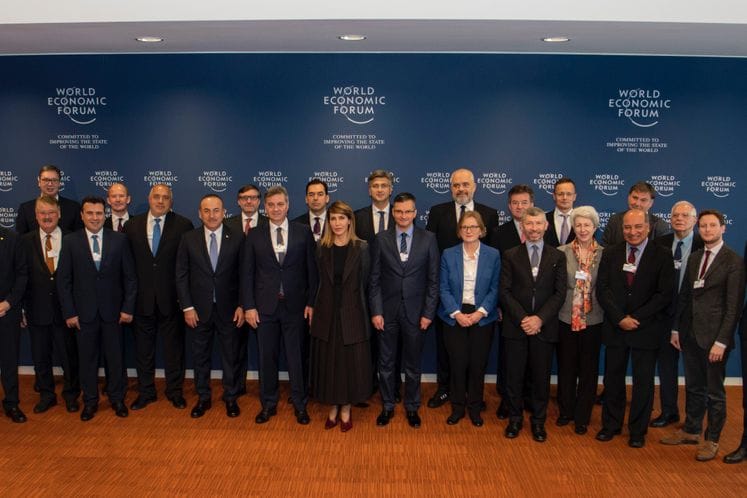- Government of Montenegro
DPM Pažin: We do not want EU to turn a blind eye, ...
Please note: The page below represents the archived content relating to the previous Government of Montenegro. Some of the information might be inaccurate or outdated.
Archive
DPM Pažin: We do not want EU to turn a blind eye, but we do expect real progress to be evaluated

Published on: Nov 8, 2019 • 8:18 PM Author: PR Service
Podgorica, Montenegro (8 November 2019) -- It is in the highest interest of Montenegro not only to access quickly to the EU, but above all to be internally ready for membership as soon as possible, fulfilling all the criteria, particularly in the rule of law, which is the basis and precondition for a European quality of life, Deputy Prime Minister for Political System, Interior and Foreign Policy Zoran Pažin noted during a meeting with senior officials of the Western Balkans, members states of the EU and European institutions that the World Economic Forum is organising in Geneva, entitled "Strategic dialogue on the Western Balkans".
The Deputy Prime Minister emphasised that the essence of the Montenegro’s European policy is to achieve a higher standard of living for citizens and to build of a society that functions according to the rules applicable in the most developed European democracies. He added that a positive transformation of the society can only be reached through a process that runs smoothly that is equally and honestly approached by both, Montenegro and its European partners.
"Montenegro has never received anything underserved in its long history, so we do not expect it neither this time. On the contrary, we are constantly working hard to build a society that respects European rules and standards. However, what we expect from our European partners is to recognise and value the real progress that Montenegro is making in the rule of law and other areas," the Deputy Prime Minister stated.
Speaking about reserved attitude on EU enlargement policy, notably France, the Deputy Prime Minister Pažin assessed as legitimate to consider a more effective way of functioning of the EU itself, adding that life in Montenegro and our region cannot be frozen due to the lack of interest of the EU, but it is a mutual interest of both, the EU and the Western Balkan to continue the process of the EU integration of our region in parallel with that process.
He added that the ideas discussed recently in the context of the reform of the negotiating framework, such as the so-called reversibility principle, do not present a sustainable solution, given the established principles of international law and the already adopted negotiating positions of the European Union and Montenegro, which were approved by all EU Member States in 2012.
DPM Pažin emphasised the significant role that Germany and other partner countries play, among which the United States in particular, in promoting European values. The Deputy Prime Minister particularly expressed his gratitude for the support to the European integration of Montenegro from the member states of the Visegrad Group, whose senior representatives also attended the meeting. In this context, he stressed that the current German principle of European integration has "rigorously but fairly" yielded concrete results and that this could be a way of continuing the EU's relations with other aspirants.
Speaking about the recent adoption of the Declaration on the so-called "mini Schengen" by the Republic of Serbia, the Republic of Albania and the Republic of North Macedonia, Deputy Prime Minister Pažin reminded that one of the key priorities is to strengthen good neighbourly relations, which is why he is fully contributing to already established regional initiatives, which for the time being are achieving the expected results precisely in the areas that are being promoted within the popular initiative called "mini Schengen". He added that he did not consider that such an initiative entails better integration into the European Union. "On the contrary, time, energy and strength of the countries of the region are being directed at creating something that already exists under other names, with the still unclear potential of how the new initiative can contribute to the European integration of the countries of the region."
It is very important, the Deputy Prime Minister stressed, that in the process of accession to the European Union, each country should be able to advance in accordance with its own merits and reform results. "Only merit-based progress towards EU membership can be a wind at the back of real reforms and provide high support of the citizens of the region to a common European future," DPM Pažin concluded.
OFFICE OF THE DEPUTY PRIME MINISTER
Related articles:
Presidents of northern municipalities: The Emirates and Alabbar are welcome in Montenegro Mar 24, 2025
Statement by Deputy Prime Minister Aleksa Bećić Mar 24, 2025
Is this page useful?
